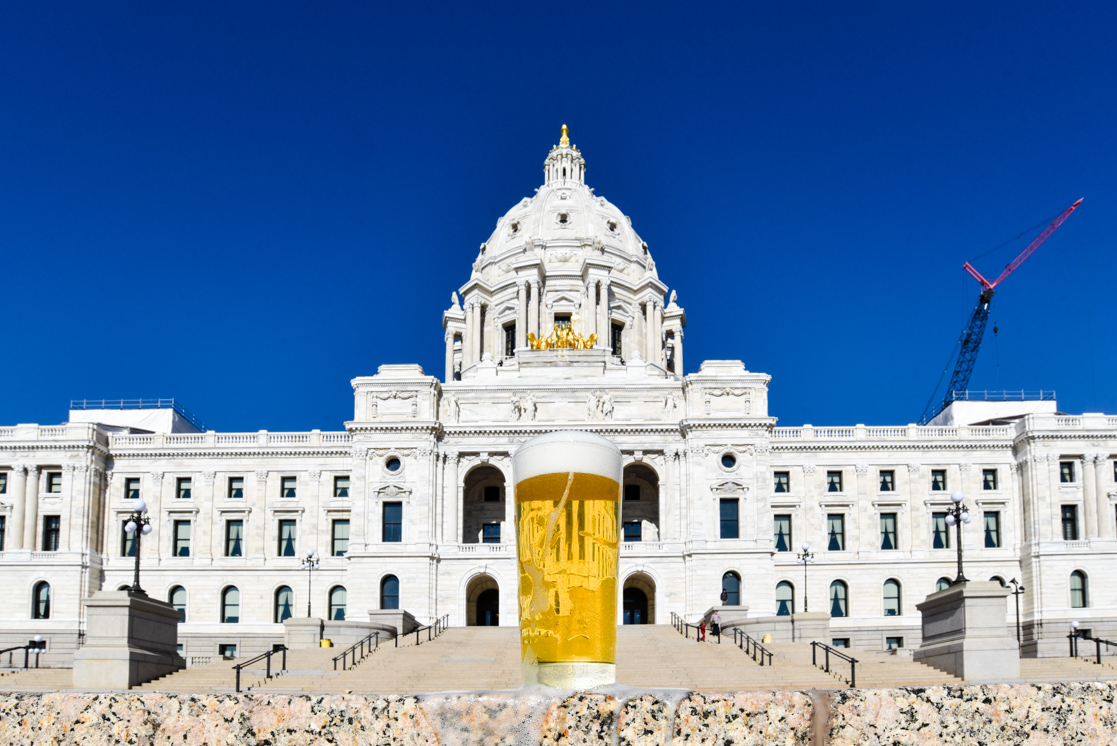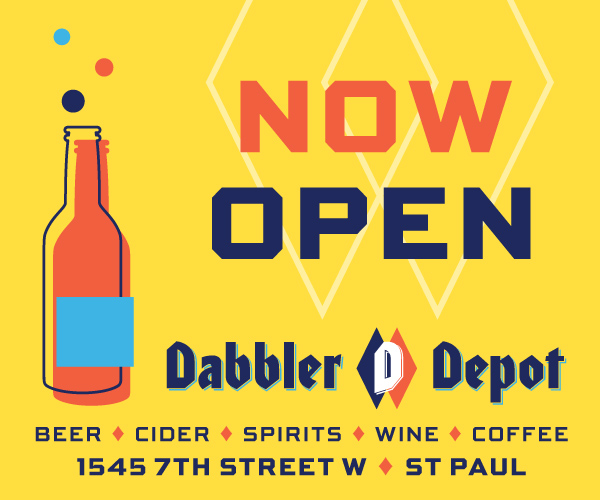
Minnesota State Capitol • Photo by Kevin Kramer
A wide-reaching liquor reform bill was introduced to the Commerce Finance and Policy Committee at the Minnesota Legislature on February 11 that seeks to aid the state’s craft beverage producers and hospitality industry, many of which are suffering economically from the COVID-19 pandemic.
The bill, titled the Drink Local Economic Recovery Package, is the result of a rare coalition of 350 craft breweries, cideries, distilleries, and wineries—organized under the newly formed Minnesota Craft Beverage Council (MCBC)—and restaurant industry groups Hospitality Minnesota and Minnesota Independent Restaurants Coalition.
According to Lauren Bennett McGinty, executive director of the Minnesota Craft Brewers Guild, the MCBC was formed in 2020 to address the many challenges facing the state’s craft beverage makers and the hospitality industry.
“As so many of the groups have worked independently to move legislation at the Capitol in the past, we thought we would be stronger together and present a unified front to make needed changes. As we began working through the various issues of the group, we narrowed down our asks to ensure that they met the most immediate needs of producers across the state. We also came together in support of our partners in the bar and restaurant world and have included their needs in this bill. The more we can find consensus, the better.”
The bill, which was chief-authored by Senator Mark Koran (32, R) and Representative Liz Olson (07B, D), would reform current liquor laws to:
- Allow bars and restaurants to sell beer, wine, and cocktails to-go by making temporary to-go allowances permanent
- Eliminate Minnesota’s growler cap on craft breweries and allow breweries to sell a limited amount of 4- and 6-packs along with Crowlers and growlers from the taproom
- Allow distilleries to sell alcohol to-go in full-sized bottles
- Allow self-distribution for cideries and brewpubs
- Retool and align laws on producer taxes and label registration fees
- Allow liquor stores, bars, and restaurants to fill growlers to-go
Lifting the Growler Cap
Currently, breweries and brewpubs producing fewer than 20,000 barrels of beer per year are allowed to sell 750-barrels worth of 64-ounce growlers and 750-milliliter vessels from their brewery locations annually. The state’s “Growler Cap” has been the subject of renewed scrutiny at the start of 2021 as five of Minnesota’s six largest breweries launched a campaign to eliminate the restriction that prohibits them from selling growlers. These breweries—Indeed, Fulton, Lift Bridge, Surly, Schell’s, and Castle Danger—are introducing their own bill to eliminate the 20,000 barrel cap on the ability to sell growlers, while keeping intact the yearly growler and 750-milliliter vessel off-sale limit of 750 barrels.
The MCBC’s bill would likewise eliminate the cap and maintain the current annual 750 barrel off-sale limit, yet would go one step further to amend the language regarding the sizes of containers that breweries and brewpubs can sell for off-sale consumption. The proposed amendment would allow breweries to sell beer in “a container that is not more than 64 ounces in size,” which opens the door to 16- and 12-ounce bottles and cans. Under the new language, brewers could sell 768 ounces of beer (which equates to 48 16-ounce cans or 64 12-ounce cans or bottles) to any individual customer per day from their breweries.
A third coalition of small Minnesota craft brewers introduced its own legislation, the Free Beer Bill (HF 121 and SF 50), that would modify packaging requirements to allow small brewers producing 7,500 barrels or less per year to sell off-sale containers of 12–64 ounces.
MCBC’s bill does not have an annual production cap associated with the ability to sell beer for off-sale consumption.
Self-Distribution for Brewpubs
Under current liquor laws, brewpubs can hold full liquor licenses that allow them to sell wine, liquor, and guest beers in addition to the brewpub’s house beer, but they are restricted from distributing their beers to retailers and cannot brew more than 3,500 barrels of beer per year. (Brewpubs can distribute their beer to other establishments under the same parent company, which is the reason you can find Town Hall Brewery‘s beer at its sister restaurants Town Hall Tap, Town Hall Lanes, and Town Hall Station.)
MCBC’s bill would amend the laws to allow brewpubs to self-distribute up to 200 barrels of beer per year to retailers, which could pave the way for brewpubs, such as Forager Brewery in Rochester or Rapids Brewing in Grand Rapids, to get their beer on liquor store shelves.
“Ultimately, these pieces of legislation, though limited and simple, will have a major impact on breweries as they work to dig out of the pandemic,” says Bennett McGinty. “We will continue to work with the government on finding other ways to support the food and beverage industry, but these changes won’t cost the state any money and will ensure that these establishments can continue to prosper as we make our way out of the pandemic.”
Standard Packaging for Distillery Bottle Sales
For Minnesota microdistilleries, the MCBC’s bill would also amend the language to the types of containers and daily quantity they can sell to customers at their locations.
“Minnesota is being left behind as other states pass laws to grow their craft beverage industries, which makes it more difficult for Minnesota distillers, breweries, cideries, and wineries to compete in our state and other states,” says Mark Schiller, co-founder of Loon Liquor Company and the current president of the Minnesota Distillers Guild.
The new language would strike the current sales limit of “one 375 milliliter bottle per customer per day” and replace it with “up to 1.5 liters per customer per day,” which equates to two industry-standard 750-milliliter bottles. The language keeps intact the requirement that any spirit sold at the distillery must also be available for distribution by wholesalers.
“The Minnesota Distillers Guild is excited to have the opportunity to combine legislative efforts with the other Minnesota Craft Beverage producers. This shared stage highlights all of our needs, and shows legislators how growing our industries will lead to more jobs at our businesses, our supply chain, and Minnesota Farmers,” says Schiller.
Redefining Cider
“The current regulations haven’t kept up with the growth of the cider industry in Minnesota,” explains Adam Ruhland, co-founder of Duluth’s Wild State Cider and a board member of the Minnesota Cider Guild. “The necessary updates presented in the new bill will allow established and new cider producers to grow through common sense tax changes and the ability to distribute their own products.”
Included in the bill is an amendment to the definition of cider that raises the allowable alcohol by volume from 7% to 8.5% and adds “pears” alongside apples in the types of fruit cider can be made from. An additional amendment would make it so that a winery producing fewer than 75,000 gallons of wine “or 250,000 barrels of cider” would qualify for the Small Winery Tax Credit.
Another major change to the liquor law would allow Minnesota’s cideries operating under the wine manufacturers license to self-distribute their product. While cideries operating under the farm winery license can already self-distribute, cideries in urban locations, such as Wild State in Duluth’s Lincoln Park neighborhood, cannot. “That distinction serves no purpose and needs to be removed so that all small cidermakers can sell to retailers, just like all brewers can sell a product of similar ABV,” Ruhland argues.
“In a year that’s been perhaps the worst ever for the hospitality industry, it’s more important than ever to make these publicly supported changes so that our members can continue to contribute to the state’s economy,” says Ruhland.
Tax Updates for Wineries
The MCBC’s bill would help align Minnesota’s tax structure with federal law simplifying the reporting process for the state’s wineries, according to Tami Bredeson of Carlos Creek Winery and the Minnesota Farm Winery Association.
“First, [the bill] brings parity with the federal government in regards to how wine is declared and measured. Currently, farm wineries must report in gallons to the federal government, but in liters to Minnesota. This unnecessarily increases our workload and adds confusion. This bill would change Minnesota reporting to gallons,” says Bredeson. “Second, the Federal Craft Beverage modernization act increased the abv for Table Wine to 16% and cider to 8.5%, Minnesota is still at under 14 and 7 respectively. This pushes many of our wines into far higher Minnesota excise tax categories.”
What’s In It For Bars, Restaurants, and Liquor Stores?
The MCBC’s liquor reform package holds two key provisions that would benefit liquor stores, bars, and restaurants—a portion of the hospitality industry that has opposed similar legislation in the past that only targeted breweries, distilleries, and wineries. The first provision would allow exclusive liquor stores the ability to fill growlers of beer for off-sale consumption. The second would allow bars and restaurants to sell up to 72 ounces of hard seltzer, cider, or beer (or 128 ounces worth of beer in growlers); up to 750-milliliters of wine; and up to 34 ounces of cocktails to-go from their establishments. The service would be limited to customers that have also purchased food for carryout.
In addition to helping the state’s bars and restaurants, this second provision would also benefit many farm wineries. “A significant number of Minnesota farm wineries operate restaurants,” explains Bredeson. “Given the rural locations of our businesses, our food operations are critical to attracting customers. Many of these winery restaurants also sell beer and cocktails. The ability to sell beer and cocktails to go, along with our wine, is an added revenue source that will help speed the financial recovery for farm wineries.”
While similar legislative policies have been proposed but have failed in the past, the fate of MCBC’s Drink Local Economic Recovery Bill could be different. With support from bar and restaurant industry groups, the bill could offer enough compromise to bring together proponents and critics who argue such reforms subvert the three-tier system and will harm liquor wholesalers and retailers, and reduce selection for the general public.
Correction: In the original version of this story, it stated that the bill would allow cideries to self-distribute. The bill would specifically allow cideries operating with a wine manufacturer’s license to self-distribute. Farm wineries are already able to self-distribute under current law.




[…] Read the rest of the article. […]
[…] there are a number of bills going around aimed at lifting the cap and more. I suggest you read this article over at Beer […]